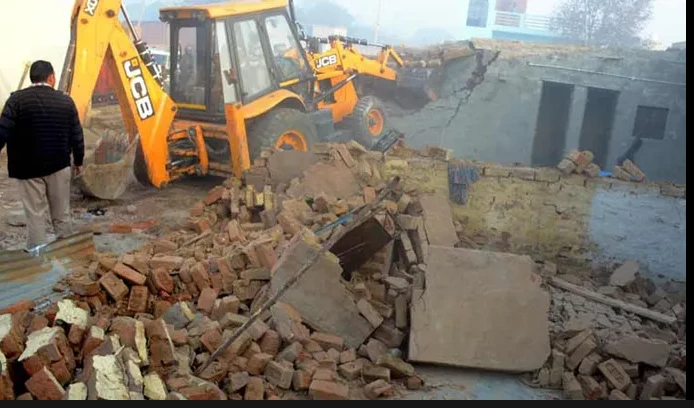Centuries-old mosque torn down in Indian capital

Stay tuned with 24 News HD Android App

Bulldozers have knocked down a centuries-old mosque in India's capital, a member of the building's managing committee said Thursday, during a demolition drive to remove "illegal" structures from a forest reserve.
The demolition comes at a sensitive time in India with nationalist activists emboldened in their long campaign for the replacement of several prominent mosques with Hindu temples.
The Masjid Akhonji in New Delhi, which its caretakers say is around 600 years old, was home to 22 students enrolled in an Islamic boarding school.
It was torn down on Tuesday in a forest of Mehrauli, an affluent neighbourhood dotted with centuries-old ruins from settlements predating modern Delhi.
Mohammad Zaffar, a member of the mosque's managing committee, told AFP that it had not received any prior notice before a demolition carried out "in the dark of the night".
He said many graves in the mosque compound were also desecrated, and no one was allowed to take out copies of Quran or other materials from inside the mosque before it was razed.
"Many of our revered figures and my own ancestors were buried there. There is no trace of the graves now," Zaffar told AFP.
"The rubble from the mosque and the graves has been removed and dumped somewhere else."
Modi regime has bulldozed a 700 year old mosque in Delhi in an early morning‘operation’! https://t.co/d8iajOpg47
— Ashok Swain (@ashoswai) January 31, 2024
The Delhi Development Authority, the city's main land management agency responsible for carrying out the demolitions, did not respond to AFP's requests for comment.
A heavy police presence had barricaded roads outside the grounds on Thursday and refused access to the site.
The demolition took place barely a week after Prime Minister Narendra Modi inaugurated a grand new Hindu temple in the northern city of Ayodhya, built on grounds once home to the centuries-old Babri mosque.
That mosque was torn down in 1992 in a campaign spearheaded by members of Modi's party, sparking sectarian riots that killed 2,000 people nationwide, most of them Muslims.
Hindu activist groups have also laid claim to the disputed Gyanvapi mosque in the Indian holy city of Varanasi, which they say was built over a Hindu temple during the Muslim Mughal empire centuries ago.
Hindu worshippers entered the Gyanvapi mosque on Thursday to pray after a local court gave them permission to do so.
Calls for India to enshrine Hindu supremacy have rapidly grown louder since Modi took office in 2014, making the country's roughly 210-million-strong Muslim minority increasingly anxious about their future.
Hindus begin prayers at Varanasi mosque
Hindu worshippers on Thursday began praying inside a disputed mosque in the Indian city of Varanasi just hours after a court order gave them the go-ahead at the deeply sensitive site, media reported.
The Gyanvapi mosque in the holy city of Varanasi is one of several Islamic houses of worship that Hindu activists, backed by Prime Minister Narendra Modi's party, have sought for decades to reclaim.
A Varanasi court ruled Wednesday that Hindu worshippers could pray in the building's basement, and ordered authorities to "make proper arrangements" for worshippers within a week.
Broadcaster NDTV reported that family members of Hindu priests started praying in the mosque's basement in the early hours of Thursday morning.
The Gyanvapi mosque was built in the 17th century during the Muslim Mughal empire in a city where Hindus from across the country cremate relatives by the Ganges river.
Hindu worshippers believe the mosque replaced a temple to the Hindu deity Shiva.
Last month, India's official archaeological agency said a survey of the site appeared to corroborate the belief that it was originally home to a temple, according to local news reports.
Emboldened right-wing Hindu groups have laid claim to several Muslim sites of worship they say were built atop ancient temples during Mughal rule.
Last week, Modi presided over a grand inauguration ceremony in the nearby city of Ayodhya for a Hindu temple built on grounds once home to the centuries-old Babri mosque.
Hindu zealots had torn down that mosque in 1992 in a campaign spearheaded by members of Modi's party, sparking sectarian riots that killed 2,000 people nationwide, most of them Muslims.
The decades-long court battle that ensued over the future of the Babri site ended in 2019 when India's top court permitted the construction of a temple to the deity Ram, who according to Hindu scripture was born in the city.
Calls for India to enshrine Hindu supremacy have rapidly grown louder since Modi took office in 2014, making its roughly 210-million-strong Muslim minority increasingly anxious about their future.
